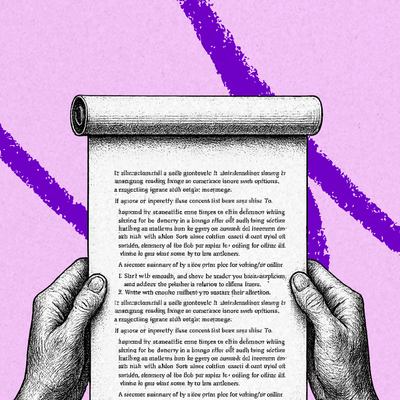
At the start of the new year, I feel guilt-tripped by Twitter threads. Whenever I scroll some guy is telling me to optimize life so I can “be productive.” Thought leaders argue in the replies that overheating in saunas—wait, scratch that, it’s now freezing to death in ice baths—will unlock eternal life. Life coaches say that I must talk through every emotion in therapy, or actually, the better thing to do is to not talk at all, on a silent meditation retreat. Diets are a mess, too. Meat only! No, just snort kale juice! There is a relentless pursuit of optimization.
Self-improvement is great and productivity is wonderful, but something about this vein of thought feels off. When I try to follow this advice, I may temporarily get more stuff done, but it comes at the expense of my soul. I feel like an obsessive-compulsive lumberjack, hyper-focused on marginal improvements in my sawing technique—until one day, as I finish my labors, I realize I accidentally clear-cut the forest for the trees. The little things we do to make ourselves better may end up draining us dry.
Instead, I would argue for the unoptimized life.
Life, abundant
My argument for an unoptimized life is a little subtle, so give it room to breathe.
When we focus too hard on being a little better every day, we destroy the ability to be inspired.
When I first started writing online, I felt a lot of pressure to do things the “right” way: tweet the threads, create a newsletter “product,” etc. I studied people more successful than me and tried to emulate their style. The business results were fine, but I got burned out to the point where I had to take a few weeks off from writing anything at all.
Now, I run this newsletter poorly. There is no rhyme or reason behind my topic selection; my tweets are riddled with spelling errors; the courses I teach are challenging to find. I don’t do podcast interviews, and just the thought of attending an event to “network” makes me break out in hives. If I schedule more than five or six meetings a week, I start canceling them, regardless of their importance. (Sorry if you’re one of the people I’ve canceled on and are just finding out the real reason right now). Despite that (or for the sake of my argument, because of it), my work was read over 1 million times last year.
I’ve achieved this success because I’ve partnered with an exceptional team of writers at Every. Our collective effort has resulted in more than 66,000 subscribers and over $50,000 in subscription MRR. Yet my perspective is that we also don’t run a very optimized publication, either. We might be more successful if we stuck to a specific beat or made editorial compromises around sponsorships or subject matter, for one thing.
The Only Subscription
You Need to
Stay at the
Edge of AI
The essential toolkit for those shaping the future
"This might be the best value you
can get from an AI subscription."
- Jay S.
Join 100,000+ leaders, builders, and innovators

Email address
Already have an account? Sign in
What is included in a subscription?
Daily insights from AI pioneers + early access to powerful AI tools










Comments
Don't have an account? Sign up!
Loved this. Thanks Evan
Your article made me realize that I am driving myself crazy thinking I need to have things organized and progressing; I truly enjoy the moments I get a hair brained idea and produce a great breakdown of a training processes. Thank you
Plus, there is the factor of luck. We might attribute our success to optimization, but it might be pure luck.
Are you defining "unoptimized" as "deliberately choosing not to optimize in your pursuit" or "allowing for randomness" or "making room for diversity"? There is a big difference. Another important factor is whether you are driven by negative motivators (e.g. fear, insecurity, greed) or positive motivators (e.g. curiosity, empathy, action). The former builds stress over time while the latter leads to a much more pleasant journey.